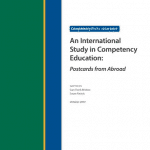Postcards from Abroad (#cworksgoesglobal)
CompetencyWorks Blog
 Today, CompetencyWorks is releasing An International Study in Competency Education: Postcards from Abroad by Sara Frank Bristow and Susan Patrick. The webinar highlighting the findings of the paper is archived here.
Today, CompetencyWorks is releasing An International Study in Competency Education: Postcards from Abroad by Sara Frank Bristow and Susan Patrick. The webinar highlighting the findings of the paper is archived here.
The paper is loaded with insights that allowed me take a step back from our work and think more broadly about three powerful changes that are taking place all around the world. First, many countries are taking steps away from one-size fits all time-based structures (even countries that don’t have a Carnegie unit to contend with still operate rigid time-based batching processes) to personalization that recognizes that students learn differently and are at different stages in their learning. Second and an equally powerful shift is that we are focusing increasingly on the higher order skills rather than the lower levels of recall and comprehension. Third, there is greater understanding that schools must design around students holistically, recognizing that their well-being and social-emotional skills cannot be isolated from learning academic skills.
As I read about how other countries invest in preparing and developing teachers, I was constantly reminded of my conversations with teachers in competency-based schools. Strong cultures of learning, an essential part of the foundation for competency education, allow teachers to benefit from job-embedded professional development. Teachers talk about how much they have learned and how much they have learned from each other once their schools converted to competency education. (Check out this video about minute 2.5. The warmth in the teacher’s voice says it all). When information management systems are available to help teachers identify which students aren’t making progress, they are able to work together to problem-solve, seek out other resources and turn to research to help them develop effective strategies. Perhaps we might even call this student-centered professional development?
With the exception of the Kunskapsskolan schools in Sweden, we didn’t find any examples that approached competency education exactly in the same way we are in the U.S. Yet, there is plenty to learn from these international examples about how to design for student agency (British Columbia refers to this as self-directed learning), comprehensive systems of assessment, and empowering our schools and teachers.
After reading this paper, I guarantee you’ll feel the excitement of being part of a tremendous global movement dedicated to doing what is best for kids.